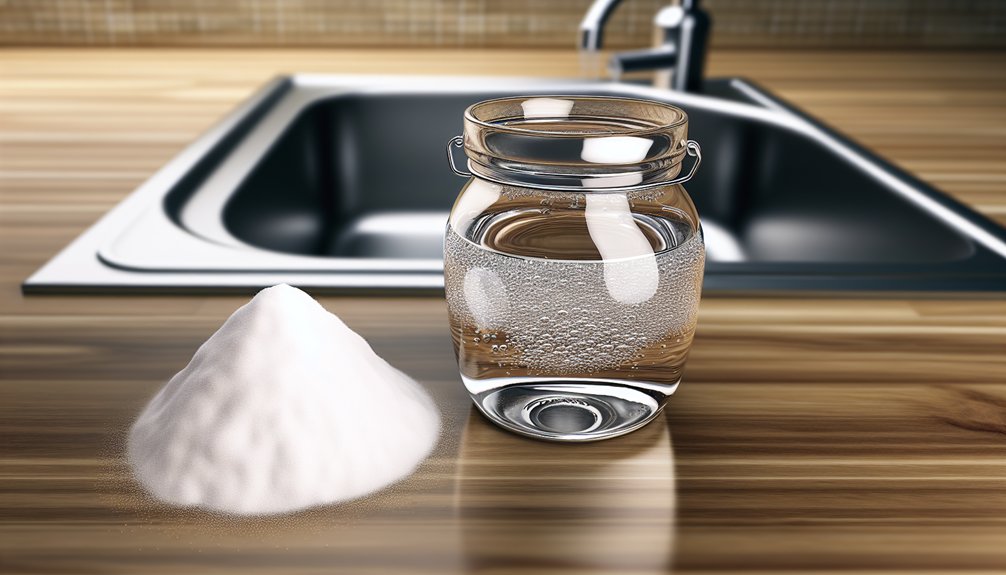For effective vinegar solutions to unclog drains, the Baking Soda and Vinegar method is highly recommended. It involves pouring ¼ cup of baking soda followed by ½ cup of vinegar into the drain, covering it, and letting it sit for 15 minutes. Another option is the Salt and Hot Water Solution, where ½ cup of salt is combined with the drain, followed by 10 cups of boiling water. Exploring these methods can reveal additional strategies for maintaining clear plumbing.
Baking Soda and Vinegar Method

When faced with a clogged drain, the Baking Soda and Vinegar Method offers a simple yet effective solution. This technique involves pouring ¼ cup of baking soda followed by ½ cup of white vinegar into the drain. The resulting chemical reaction produces carbon dioxide, which aids in dislodging blockages. It is advisable to cover the drain to contain the fizzing mixture, allowing it to sit for about 15 minutes for peak effectiveness. After this waiting period, flushing the drain with 2 quarts of hot water helps clear any loosened debris, thereby preventing future clogs. Regular use of this method can maintain clear pipes and avert buildup, making it as effective as commercial drain cleaners while being eco-friendly. The Baking Soda and Vinegar Method provides a liberating alternative for those seeking non-toxic solutions to unclog their drains efficiently.
Salt and Hot Water Solution
A highly effective method for addressing clogged drains involves the combination of salt and hot water. This solution excels in dissolving grease and soap clogs, as the salt works to break down the buildup while hot water melts hardened residue. To implement this method, one should pour ½ cup of salt down the clogged drain and let it sit for five minutes. Following this, flushing the drain with 10 cups of boiling water yields ideal results. The hot water is essential, as it aids in dissolving and washing away accumulated grease and debris within the plumbing systems. Furthermore, this approach serves as a natural alternative to harsh chemical drain cleaners, making it environmentally friendly and safe. Regular application of the salt and hot water solution can greatly maintain clear drains and effectively prevent future clogs from forming, promoting a healthier plumbing environment.
Tips for Preventing Future Clogs

Preventing future clogs requires proactive measures to maintain a clear plumbing system. Homeowners should regularly dispose of fats and oils in a disposable container instead of pouring them down the drain, as this helps prevent buildup. Installing drain baskets or guards in sinks and showers is essential to catch hair and food particles, effectively minimizing potential clogs.
A monthly maintenance routine can be implemented by flushing drains with a mixture of baking soda and vinegar, followed by pouring boiling water to dissolve minor buildup. When using the garbage disposal, running cold water can solidify grease, making it easier to chop and flush through the system.
Additionally, it is vital to clean drain baskets and guards regularly to remove accumulated debris, which further aids in preventing blockages. By adopting these homemade solutions, individuals can maintain peak drainage and avoid future plumbing issues.
Frequently Asked Questions
Which Vinegar Is Best for Clogged Drains?
When considering which vinegar is best for clogged drains, white vinegar stands out due to its high acidity and cleaning properties. Apple cider vinegar serves as a natural alternative, effectively aiding in odor removal and grease breakdown. Both options are eco-friendly solutions that can enhance drain maintenance while promoting plumbing safety. For best results, usage tips include combining one cup of vinegar with boiling water to improve clog-clearing effectiveness.
How to Unblock a Drain With Vinegar?
In the tense moment of a plumbing emergency, one might wonder how to unblock a drain effectively. The answer lies in a simple vinegar drain recipe. Combining household vinegar with baking soda initiates a fizzing reaction, serving as a natural drain cleaner. This eco-friendly unclogging method not only provides vinegar cleaning benefits but also stands against harsh chemicals. Regular application serves as preventive drain care, ensuring smooth flow and reinforcing DIY plumbing solutions for long-term drain maintenance.
Do Baking Soda and Vinegar Really Unclog Drains?
The effectiveness of baking soda and vinegar for drain cleaning lies in their chemical reactions, which produce carbon dioxide bubbles that help dislodge minor clogs. As a natural remedy, this DIY method serves as an eco-friendly alternative to harsh chemicals. Maintenance tips suggest regular use can prevent buildup. However, effectiveness comparisons with commercial solutions may vary, making it essential to explore a range of plumbing tips and household hacks for best results.
How Long Should Vinegar Sit in a Clogged Pipe?
In the domain of DIY drain remedies, the effectiveness of vinegar hinges on time. Vinegar should ideally sit in a clogged pipe for 30-40 minutes for best results. This vinegar cleaning benefit lies in its high acidity, which breaks down common blockage causes. By allowing the solution to penetrate, one enhances pipe care techniques. Following this, hot water guarantees debris removal, reinforcing the eco-friendly solutions that debunk plumbing myths and promote natural unclogging methods.


